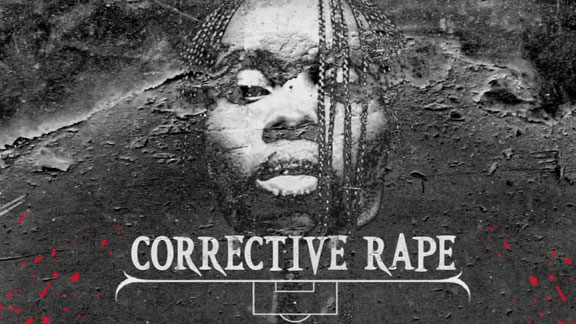

South Africa has been termed 'the rape capital of the world'. Outside of countries engaged in war or other conflict, it has the highest rate of rapes worldwide. Statistics reveal that one in every two women will be raped during her lifetime. A rape takes place every 17 seconds. Numerous high-profile cases, such as the brutal rape and murder of the lesbian footballer Eudy Simulane (above, left) have drawn the world's attention to the disturbing phenomenon intersecting in South African societies.
A distinction should perhaps be made between heterosexual women, both white, black and coloured, who suffer rape (whether at the hands of partners, husbands, family members, or strangers); and lesbians who endure corrective rape in an attempt to "make them straight". Either way, rape is often justified on the dangerous grounds that a woman is "asking for it": as noted by Helen Moffett of the University of Cape Town, if she dares to practice freedom of movement (moving around in open spaces), makes eye contact, adopts a confident posture or gait, or speaks out for herself, she is viewed as a dangerous, autonomous being who threatens established gender boundaries and thus deserves to be "disciplined" through sexual violence. Disturbingly, rape is interpreted often as "a socially approved project" to keep women in their place.

Above: LGBT rights activist and lesbian Noxolo Nogwaza was raped, stoned and stabbed to death in KwaThema, Gauteng, South Africa in 2011.
Corrective rape is a frightening phenomenon in its own right in the wider discourse of rape and sexual violence in South Africa. Men rape lesbians out of a desire for these women to become "real women". Famously, Sizakele Sigasa, a women's and gay rights activist, and her friend Salone Massooa were gang-raped, tortured and executed in 2007 - yet no one was ever convicted for these two women's murders. There is a significant paradox here, for South Africa's constitution has long been recognised as one of the most progressive in the world, in promising gender and sexual equality to all citizens. Yet as the prevalence of rape and sexual violence escalates, this can increasingly be viewed as barely more than a fiction.
As Amanda Lock Swarr (2012) argues, lesbians expose the vulnerability of male masculinities, since putatively successful masculinity is viewed as dependant upon men's need to control women and force them to follow gendered conventions of heterosexual conduct. Those who deviate often pay a heavy price for their actions. Political leaders in Africa more generally complicate this, in teaching that homosexuality is not natural, alien to Africa, a perverse import from the degraded West. Of course, the western culture of South Africa somewhat refutes this, but it cannot be denied that religious influences are bound up with prevailing notions of what proper gender roles are and should be.
Scholars, human rights and LGBT activists have repeatedly urged solutions to increasing rape levels in South Africa. But it is difficult to understand what can be done, in a society where entrenched gender ideals and social norms remain powerful and widely held. Perhaps it is right to agree with the arguments of some theorists that rape and sexual violence has escalated because of a 'crisis of masculinity', but whether a broader solution can be found to this unsettling and upsetting turn of events cannot be determined.

Above: "The Rainbow Nation" - the ultimate paradox?
"but whether a broader solution can be found to this unsettling and upsetting turn of events cannot be determined"
ReplyDeleteYou must be kidding me!!! That conclusion is academic garble. The solution to stopping rape in Africa is providing shelters for women, lawyers without borders, and halting all aid to Africa until they quit blaming the west for homosexuality.